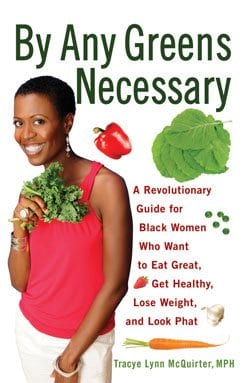
At a time when nearly 80 percent of African American women are overweight, author and nutritionist Tracye Lynn McQuirter has decided to fight back.
Black women are in the middle of a “health crisis” she told an audience at the Boston Vegetarian Food Festival in Roxbury last weekend — in addition to overweight and obesity, they lead the country in rates of heart disease, strokes, diabetes and cancer.
“I want us to take back control of our health,” she said to the enthusiastic crowd. “I want us to take back control of the health of our families, and of our communities, of our cities, and basically of the country itself,” she continued. “And we have the power to do that.”
Outlining her new book, “By Any Greens Necessary: A Revolutionary Guide for Black Women Who Want to Eat Great, Get Healthy, Lose Weight, and Look Phat,” McQuirter explained the benefits of a plant-based diet to people and the planet, and offered tips on how to transform an unhealthy diet into a healthy one.
Although McQuirter is a nutritionist by profession, she also spoke from personal experience. Growing up, she explained, she hated vegetables, and would push them around her plate for hours at the dinner table. But as an undergraduate at Amherst College in the mid-1980s, grappling with issues of imperialism, racism and sexism, she also began to think more critically about the food she was eating.
She eventually became a vegetarian, then a vegan — shunning all animal products, from meat and fish to eggs, cheese and milk. McQuirter’s mother also became a vegan, and with regular exercise, “worked to change the paradigm” of chronic disease in their family. Both of McQuirter’s maternal grandparents died of chronic disease, but her mother, at age 74, boasts of having “no health concerns at all.”
The example of her own family, McQuirter said, should show people that “diet trumps DNA,” and that “what you eat overrules everything.”
McQuirter eventually continued her education and received a master’s of Public Health in nutrition from New York University. Since then, she has worked as a health and vegan activist in Washington, D.C., teaching public school students and low-income residents about nutrition, starting black vegetarian organizations for the estimated 1.5 million African American vegetarians and pushing for food policy reforms.
In her book, she discusses each food group from her nutritional expertise, dispelling rumors that vegetarians don’t get enough protein, warning against the cholesterol in eggs and meat, explaining the dangers of industrial farming and fishing, and promoting the benefits of fruits and vegetables.
But for McQuirter, food isn’t just about health — it’s also about politics.
“What you eat is more political than personal,” she says in her book. “Government and giant corporations play a defining role in determining our food choices.”
Her book also delves into the reasons why certain foods are more likely to make it to the dinner table than others. For instance, she explains, “One of the main reasons that processed foods are so cheap is that the USDA [the U.S. Department of Agriculture] provides federal subsidies to the food industry to make the cost of production cheaper.”
“By contrast, fruit and vegetable farmers don’t get large federal subsidies because they can’t afford lobbyists or large campaign contributions,” she continued.
She also exposes the negative influence of advertising. The food industry spends $35 billion on advertising per year — more than any other industry in the United States. But more than 70 percent of these advertising dollars are spent on “fast food, processed foods, snacks and sweets,” whereas just 2 percent is spent on fresh, healthy foods. This junk food advertising budget is also more than 50 times greater than what the USDA spends on nutrition education annually.
In addition, consumption of meat contributes to environmental degradation, according to her book. “Livestock production for meat and dairy causes more global warming than the entire world’s transportation combined,” she said.
“A hamburger damages Mother Earth more than a Hummer does,” she added.
For McQuirter, knowing where food comes from is just as important as what it does to your body. “If you liberate your mind, your mouth will follow,” she told the crowd in Roxbury.
But she is sure to stress that eating healthfully — and eating vegan — is also delicious. “I love good food, I love to eat,” McQuirter said at the festival. “I don’t come to this from the point of view that you have to deprive yourself of anything.”
“By Any Greens Necessary” also includes recipes for more than 40 vegan dishes, including Mediterranean chickpea salad, lentil soup, broccoli ginger cashew stir-fry, spicy collard greens, chocolate mousse tart and strawberry cheesecake.






